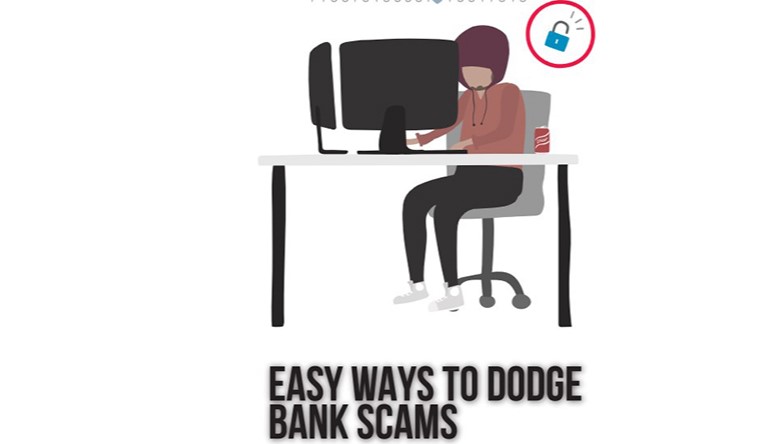
Often or sometimes emails and phone calls are just scammers using the trust you have in your bank to swindle you out of your money. Possibly the most common bank scam is getting you to transfer money out of your account. Three methods technology can help an individual, but still it may down any time. Biometrics, Tokenization and Big data can cut bank scam, but customers still need their intellects about these because at present there are a wide variety of scams. Con artists practice to share account holders from their cash involving bogus phone calls, fake emails, bank cards and ATMs.
Some common scams from where people should be aware of:
Bank Card Scams
There are a large number of credit card frauds, and one of the most common ways to get the card details is when anyone shopping through online.Unsafe websites that only say http rather than https in their website address can be pounce on and spyware can be installed on your computer, so scammers can see everything what you’re doing through online.But other scams are low tech. Letters with new credit or debit cards can be stolen. After some time a person will get a phone call from the outsiders, want to know about the card by asking few details to approve which allows them to start using it.
Combating bank card scams
Don’t use websites that only have http in the address rather than https and never use in public Wi-Fi in coffee shops or shopping centres to shop or bank online.Try to make sure the antivirus and operating system software is up to date. Strong passwords can also help to protect the online accounts.Token transactions are increasingly being used for UK card transactions. Law firm Taylor Wessing explains: “Tokenization is where a unique ‘token’ is generated for each transaction, keeping all delicate data, such as the cardholder’s name and card number, stowed remotely. So, even if a fraudster gotten the ‘token’, they couldn’t use it to detect any personal information.”
Banks are also increasingly turning to biometrics to moan up security
In April, NatWest became the first bank in the UK to trial fingerprint technology on debit card payments over £30. The card holds an electronic copy of the customer’s fingerprint on one place. The customer places their finger on that part of the card while signaling it at a retailer’s payment terminal, it will authorize the payment. The customer will not have to input their PIN number, which indicates hackers will not have the chance to access it.
Bank transfer scams
This is maybe the most common banking scam, and relates customers transferring money from their own accounts.Clients get a phone call to ask forto be from their bank generally for alerting to a security or technical problem related to their account. They will askto handover all the cash from an account into a ‘safe account’ until the problem is resolved.However, this call does not derive from the customer’s bank. If the handover is made, the funds will be instantly salted away to other accounts around the world.
Encountering bank phone scams
The first thing to keep in mind is that a bank will never ask you to handover money into a ‘safe account’. It simply does not happen.Also, banks will never ask you to disclose personal information such as your PIN, or any passwords.
If in any hesitation, hang up the phone on the person who purports to be from the bank and call the moneylender directly using the number on credit or debit card. If there really is a problem with an account, assistants there will be able to tell it. In many ways; this is the hardest scam to fight against, because it is the con trick at its most basic. One person is charming, or alarming, another person, for financial gain. Banks prefer email communication, but there will always be a requirement for customers to call on occasion.
Phishing scams
• Phishing scams, or fake emails, are common and usually use a trusted company, such as bank, to achieve confidence.
• These emails instruct to click on a link in the message and login to the bank to approve a transfer, or to confirm other details.
• The link takes a fake website that allows scammers can then use the information to access an account and transfer money.
What a person need to do for combating phishing scams:
• At first take a close look at these emails. Fraudsters generally use a generic welcome, such as Dear Sir/ Madam or Valued Customer. A real email from a bank will address the name.
• Then take a look at the email address. Fake emails may come from an address which is either just a series of letters and numbers, or have a spelling mistake.
• The best thing need to do that is not to click the link. If anyone thinks the email might be genuine, go to the online bank and login as normal and see if there is a message.
Law firm “Taylor Wessing” says the drive towards “real-time payments enhance to greater risks of fraud and money laundering.” But the firm adds big data and the cloud can play an important role here. The firm adds: “Data analytics are capable to screen a person’s usual expending behaviors and flag an unfamiliar transaction, thereby identifying potentially falsified transactions faster and more accurately than afore.”
Reporting bank scams
Interaction with bank as soon as realize something has gone erroneous and tell them exactly what takes place. Then the bank can take sudden initiatives to stop that account.Secondly, an individual can get in touch with Action Fraud Alert by online.








